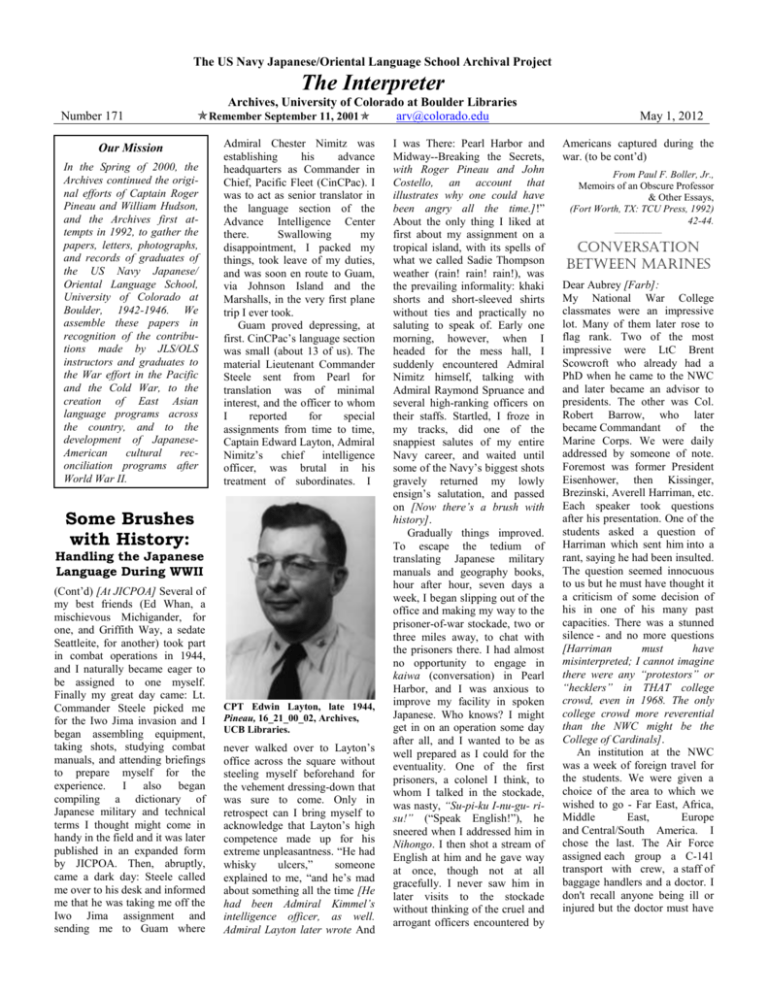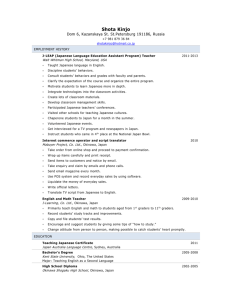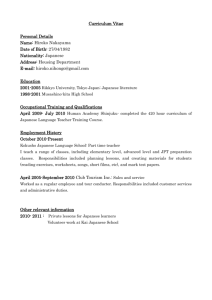The Interpreter - University Libraries
advertisement

The US Navy Japanese/Oriental Language School Archival Project The Interpreter Number 171 Archives, University of Colorado at Boulder Libraries Remember September 11, 2001 arv@colorado.edu Our Mission In the Spring of 2000, the Archives continued the original efforts of Captain Roger Pineau and William Hudson, and the Archives first attempts in 1992, to gather the papers, letters, photographs, and records of graduates of the US Navy Japanese/ Oriental Language School, University of Colorado at Boulder, 1942-1946. We assemble these papers in recognition of the contributions made by JLS/OLS instructors and graduates to the War effort in the Pacific and the Cold War, to the creation of East Asian language programs across the country, and to the development of JapaneseAmerican cultural reconciliation programs after World War II. Admiral Chester Nimitz was establishing his advance headquarters as Commander in Chief, Pacific Fleet (CinCPac). I was to act as senior translator in the language section of the Advance Intelligence Center there. Swallowing my disappointment, I packed my things, took leave of my duties, and was soon en route to Guam, via Johnson Island and the Marshalls, in the very first plane trip I ever took. Guam proved depressing, at first. CinCPac’s language section was small (about 13 of us). The material Lieutenant Commander Steele sent from Pearl for translation was of minimal interest, and the officer to whom I reported for special assignments from time to time, Captain Edward Layton, Admiral Nimitz’s chief intelligence officer, was brutal in his treatment of subordinates. I Some Brushes with History: Handling the Japanese Language During WWII (Cont’d) [At JICPOA] Several of my best friends (Ed Whan, a mischievous Michigander, for one, and Griffith Way, a sedate Seattleite, for another) took part in combat operations in 1944, and I naturally became eager to be assigned to one myself. Finally my great day came: Lt. Commander Steele picked me for the Iwo Jima invasion and I began assembling equipment, taking shots, studying combat manuals, and attending briefings to prepare myself for the experience. I also began compiling a dictionary of Japanese military and technical terms I thought might come in handy in the field and it was later published in an expanded form by JICPOA. Then, abruptly, came a dark day: Steele called me over to his desk and informed me that he was taking me off the Iwo Jima assignment and sending me to Guam where CPT Edwin Layton, late 1944, Pineau, 16_21_00_02, Archives, UCB Libraries. never walked over to Layton’s office across the square without steeling myself beforehand for the vehement dressing-down that was sure to come. Only in retrospect can I bring myself to acknowledge that Layton’s high competence made up for his extreme unpleasantness. “He had whisky ulcers,” someone explained to me, “and he’s mad about something all the time [He had been Admiral Kimmel’s intelligence officer, as well. Admiral Layton later wrote And I was There: Pearl Harbor and Midway--Breaking the Secrets, with Roger Pineau and John Costello, an account that illustrates why one could have been angry all the time.]!” About the only thing I liked at first about my assignment on a tropical island, with its spells of what we called Sadie Thompson weather (rain! rain! rain!), was the prevailing informality: khaki shorts and short-sleeved shirts without ties and practically no saluting to speak of. Early one morning, however, when I headed for the mess hall, I suddenly encountered Admiral Nimitz himself, talking with Admiral Raymond Spruance and several high-ranking officers on their staffs. Startled, I froze in my tracks, did one of the snappiest salutes of my entire Navy career, and waited until some of the Navy’s biggest shots gravely returned my lowly ensign’s salutation, and passed on [Now there’s a brush with history]. Gradually things improved. To escape the tedium of translating Japanese military manuals and geography books, hour after hour, seven days a week, I began slipping out of the office and making my way to the prisoner-of-war stockade, two or three miles away, to chat with the prisoners there. I had almost no opportunity to engage in kaiwa (conversation) in Pearl Harbor, and I was anxious to improve my facility in spoken Japanese. Who knows? I might get in on an operation some day after all, and I wanted to be as well prepared as I could for the eventuality. One of the first prisoners, a colonel I think, to whom I talked in the stockade, was nasty, “Su-pi-ku I-nu-gu- risu!” (“Speak English!”), he sneered when I addressed him in Nihongo. I then shot a stream of English at him and he gave way at once, though not at all gracefully. I never saw him in later visits to the stockade without thinking of the cruel and arrogant officers encountered by May 1, 2012 Americans captured during the war. (to be cont’d) From Paul F. Boller, Jr., Memoirs of an Obscure Professor & Other Essays, (Fort Worth, TX: TCU Press, 1992) 42-44. _______________ Conversation Between Marines Dear Aubrey [Farb]: My National War College classmates were an impressive lot. Many of them later rose to flag rank. Two of the most impressive were LtC Brent Scowcroft who already had a PhD when he came to the NWC and later became an advisor to presidents. The other was Col. Robert Barrow, who later became Commandant of the Marine Corps. We were daily addressed by someone of note. Foremost was former President Eisenhower, then Kissinger, Brezinski, Averell Harriman, etc. Each speaker took questions after his presentation. One of the students asked a question of Harriman which sent him into a rant, saying he had been insulted. The question seemed innocuous to us but he must have thought it a criticism of some decision of his in one of his many past capacities. There was a stunned silence - and no more questions [Harriman must have misinterpreted; I cannot imagine there were any “protestors” or “hecklers” in THAT college crowd, even in 1968. The only college crowd more reverential than the NWC might be the College of Cardinals]. An institution at the NWC was a week of foreign travel for the students. We were given a choice of the area to which we wished to go - Far East, Africa, Middle East, Europe and Central/South America. I chose the last. The Air Force assigned each group a C-141 transport with crew, a staff of baggage handlers and a doctor. I don't recall anyone being ill or injured but the doctor must have administered a lot of hangover remedies. Our first stop was Mexico City where, as at every stop, we were escorted about by the local military. Those of us who were tequila fanciers loaded up on the fine but cheap varieties. Our next stop was Nicaragua where Somoza was in charge. He had attended West Point and was a classmate of one of our group. He threw a big beach-side whole steer BBQ at one of his villas, provided potables and gave us each a big box of the best Nicaraguan cigars. Our next stop was Lima, Peru where we were greeted at our hotel with waiters bearing trays of pisco sours, which necessitated some hangover treatments. At each stop the local US Military Attaché arranged for the American Ambassador to host a get-together so we all stood in line to meet the Ambassador. Same drill in Chile. We then flew over the Andes to Buenos Aires where the local military put on one of their famed equestrian exhibitions. They then took us on a side trip to Mar del Plata, a seaside resort. We next stopped in Venezuela, where the local military entertained us lavishly. At the time the pay scale of their officers was higher than that of their US counterparts - courtesy of petroleum resources. While we were still in Caracas we got word that Martin Luther King had been shot and that there were riots in Washington. We took off at once. As we approached Andrews Air Force base we could see columns of smoke arising from the city. Wives had come to pick most of us up. As we drove home we encountered armed troops on the bridges leading into the city. Back at Ft. McNair each travel group reported in its trip and we graduated. A number of us stayed on to take some additional courses. I finished the thesis I had been working on and qualified for an MA in International Relations. I then went back for resume regular duties at Langley. Semper Fi Glenn Nelson JLS 1944 _______________ Recent Losses: Duke Professor Acclaimed Economist, Died at 82 Internationally known economist Martin Bronfenbrenner, Duke University's first Kenan Professor, died Monday (June 2nd, 1997) in his Durham, N.C. home. He was 82. He was noted for his contributions to macroeconomics, the theory of income distribution, comparative economics and Western understanding of the Japanese economy. The retired professor continued to attend conferences and teach at Duke until he became ill during the Spring 1997 semester. Born in Pittsburgh, Pa., on Professor Martin Bronfenbrenner December 2, 1914, Dr. Bronfenbrenner graduated from Washington University in St. Louis, Mo. He received his doctorate in economics in 1939 from the University of Chicago. In addition to his Kenan professorship at Duke, Dr. Bronfenbrenner held a Fulbright appointment in Japan and visiting appointments at the Center for Advanced Study in Behaviorial Sciences at Stanford, the University of Sussex and at the Federal Reserve Bank of San Francisco. In January 1997, Dr. Bronfenbrenner was named a Distinguished Fellow of the American Economics Association. His scholarly associations also included serving as a fellow of the American Academy of Arts and Sciences, vice president of the American Economic Association (1975) and president of both the Southern Economic Association (1979) and the History of Economics Society (1983). In 1984, Bronfenbrenner became professor emeritus at Duke, and the Martin Bronfenbrenner Graduate Fellowship was established in his honor. For the next six years, he was professor of international economics at Aoyama Gakuin University in Tokyo, returning to Durham in 1991. Dr. Bronfenbrenner wrote five books and approximately 250 articles for scholarly publications. The fluent Japanese speaker also published a fiction collection, "Tomioka Stories from the Japanese Occupation," based upon his experience as a language officer in Japan after World War II. Dr. Bronfenbrenner is survived by his wife, Teruko Okuaki Bronfenbrenner, of Durham; a son, Kenneth Bronfenbrenner, of New York; a daughter, June K. Bronfenbrenner-Walker, of Severna Park, Md.; and a grandson, Brian J. Walker, of Severna Park, Md. Memorials may be made to: May: But by good luck, somebody who had known me, or known of me, at Harvard was head of a small intelligence periodical that wanted one language man, so I got moved down there with a great deal more freedom and a great deal more interesting work. As I got onto it, and since there wasn’t much translation, gradually they let me try writing pieces. I [found writing] pieces for this periodical very useful because you had to go fast, you couldn’t hesitate and re-read. If you were told to come up with an article on Japanese radar, even if you hardly knew what radar was, you talked to the people who knew something about it, and did the best you could - fast. May: After a year I decided that I would like to see how I stood up in a forward area. I wrote and got Jean’s permission to try to make that change, talked to a powerful officer, a captain in intelligence who’d supervised the bulletin, and got myself transferred to be the language man for Amphibious Group 12. That was getting ready for the Okinawa campaign. Lage: Tell me why you wanted to move into more active duty. May: I didn’t like it at Pearl and Duke University (Note: for I think, also, I wanted to see Martin Bronfenbrenner whether I’d gotten over early Endowment) timidities enough to be able to Office of Gift Records take it, for one thing. And I Box 90581 wanted to be in on what I Duke University thought was the big experience Durham, NC 27708 for my generation, to put it pompously. A glimpse at Professor Lage: But you had that thinking Bronfenbrenner's rich life and at the time? contributions can be found in "Instead of a Philosophy of Life"; May: Yes. And it turned out that I was right that is, I had a much "A Conversation with Martin better time from then on to the Bronfenbrenner"; and "An end of my military service. Airport Economist in the Lage: Last time we had you Ryukyus (November 1949)." transferring to the Amphibious http://www.econ.duke.edu/History/Br Group 12 and getting ready for onfen/obit-bronfen.html _______________ Okinawa. So let’s go on from there. Excerpt from: May: I was very happy to Henry F. May transfer from my desk job in PROFESSOR OF Pearl Harbor to Phib Group 12. This was a group of about a AMERICAN INTELLECTUAL HISTORY, dozen officers and enlisted men who had been together in the UNIVERSITY OF CALIFORNIA, BERKELEY, Battle of Britain and knew each other very well. They were all 1952-1980 from New England and they (Cont’d) Amphibious Group 12 accepted me right away as and the Okinawa Operation completely one of them. It was fascinating to be in on the planning for the Okinawa operation. Okinawa was out of bounds by Japanese military rules and had been for quite a while, so practically nobody knew anything about it. I did some research in the Honolulu public library, [laughs] reading books that had been written a long time ago with information that was obsolete. And we took along with us an elderly man from Honolulu who was a shell collector and this was voluntary, he wasn’t kidnapped or anything, and therefore had spent some time in Okinawa. Lage: Was he of Japanese descent? May: No, American. He, like so many, had had a Japanese mistress when he’d lived in Japan, who banked his money and treated him very well, but he kept saying, "Why don’t we wipe them all out?" Lage: Oh, my! May: I said, "But think of your girlfriend and all the other nice people you knew." And he said, "Well, I might feel that way if I was interested in people, but I’m not. I m interested in shells." But I’m well ahead of where I was because we did a lot of planning and got to know each other, and then before we left, in very traditional style, had a dinner with a lot of singing and so forth, naturally in a Japanese restaurant. [laughs] And then we got under way. On the ship I found that all the traditions, and the rules, and vocabulary, and hierarchy of the Navy, which were just cumbersome and a nuisance on land, seemed to make an awful lot more sense. Also, it was a common perception that the same people who might be backbiting and selfish ashore at a desk job, on a ship, especially moving toward a combat area, were just ever so much more agreeable, unselfish. That was a very good part of the experience. It was a long voyage, naturally, and the first parts of it very pleasant going through islands in the South Pacific and then the Central Pacific, where we stopped and I picked up shells for Jean. So far there was always an officer’s club with drinks. Lage: Were you all expecting that that was going to be the next Invasion of 1945 Okinawa, April 13, step [Invasion of Japan]? May: Oh, yes. But I went back to Pearl Harbor and by this time I knew enough when there was no accommodation for me--to bribe an enlisted man with a bottle of whiskey, which he couldn’t get, and get him to put me temporarily one place or another. Finally I got a more permanent room with three southern ensigns, very young, who talked about nothing but girls all the time. Really, this second period was no good. I was back at work on the intelligence magazine that I’d been on. Lage: The same thing you d been working on? May: Yes. (to be cont’d) an oral history conducted in 1998 by Ann Lage, Regional Oral History Office The Bancroft Library, University of California, Berkeley, 1999, 57-58. _______________ Wayne R. Gruner NSF Administrator OLS 1945 Wayne R. Gruner, 87, a retired assistant to the assistant director of the National Science Foundation, died April 11, 2009, at his home in Gaithersburg of complications from Alzheimer's disease. Mr. Gruner was with the foundation from 1960 until his retirement in 1980. He started as the program director for theoretical physics, managing a budget that grew over the years to $30 million from $6 million. In 1970, he became the senior staff associate to the deputy assistant director of research and had responsibility for NSF grant research support in all the science fields. He developed plans and budgets, testified before Congress and gave lectures on government support for science. In 1978, he became the senior science associate assigned to NSF's regional office in Tokyo, where he helped maintain the U.S.-Japan Cooperative Science Program. In retirement, he worked as a science consultant to the National Aeronautics and Space Administration. He was born Wayne Robert Gruner in Minneapolis and received a bachelor's degree in math and physics from the University of Minnesota in 1942. He began working on a master's degree at the University of California at Berkeley but left to serve in the Navy during World War II. He learned Japanese through the Navy and saw duty in the Pacific. After Japan's surrender, he worked in law enforcement and police supervision in Yokosuka, Japan. Mr. Gruner was a protege of atomic scientist J. Robert Oppenheimer and followed him from Berkeley to Princeton, where Mr. Gruner received a master's degree in physics in 1947. He worked for the Naval Ordnance Laboratory and the physics branch of the Office of Naval Research before joining NSF. Mr. Gruner, who had some familiarity with at least five languages, loved to travel and always learned enough of the language of the countries he visited to appreciate the culture and to communicate with the natives. He also maintained a lifelong interest in sports cars, motorcycles, sailboats, target shooting and flower gardening. His marriage to Carolyn Hodgson Gruner ended in divorce. Survivors include his wife of 38 years, Sarah Bolyard Gruner of Gaithersburg; three daughters from his first marriage, Karen Gruner of Frederick, Nora Gruner of Fairbanks, Alaska, and Wendy Graves of Duluth, Minn.; two stepchildren, Cheryl Starke of Libertytown, in Frederick County, and Kevin Starke of Bethesda; a sister; a brother; and two grandchildren. Joe Holley Washington Post April 17, 2009 _______________ Recent Losses: TOKYO ROSE – AND FELL Wife Jean, David Cole (age 2) and I arrived in Tokyo in December 1952 where I was assigned as Book Translations Officer (I am bilingual in Japanese) charged with stimulating commercial translation and publication of American books deemed productive in shaping Japanese public opinion on such US policy issues as “Atomic Weapons Are Good for You, Communists Are Not”, “Russia Is the Antichrist”, and “You Need Our Kind of Democracy”. The trick was, since no intelligent Japanese would buy these no-brainers, WE did – in big lots – so the titles appeared on the best seller lists and then the Japanese did buy them, because everybody buys best sellers. Pretty neat, huh? Small problem: In the halls of the Mantetsu (South Manchurian Railroad) Building, the former cockpit of Japan’s rape of China, I run into a cheerful color blind fellow Language Officer named Carl Bartz. “Hey Carl, I say what’s your assignment here?” “Book Translations Officer,” he replies cautiously. “You can’t be”, I say, “I am the BTO”. “Yeah,” he says, “but I got here first – run out of Korea when the North cleaned our clock. Just got here. You hadn’t yet. So I got your job.” The Embassy was required to take officer refugees and give them jobs. “Oh yes, I got your housing too”. I believe in Choice: Insult him, Kill him, or get back on the plane. We ended up in a second class hotel. Second morning, a large mouse traipsed across our window ledge and fortuitously fell into a waste basket over which I placed a magazine. The on-duty samurai was summoned. He looked at the invader and with genuine indignation declared it to be a rat. Clean places don’t have mice, he explained, only dirty places. Clean places have rats. Oh. Of course. But wait: There was another option on the job front. Maybe a higher up vacancy was available. After all, I was a CIA veteran with several years as translator/analyst of occult classified documents in Japanese, Russian, Chinese and Georgian (Stalin was Georgian and somebody had to read his mail). This was very glamorous work. What we needed were copies of newspapers from Siberia where nuclear and missile developments were afoot. Our only hope of getting them was from Japanese POW’s repatriated from Soviet prison camps. This is all very fine, but these papers were given to prisoners for toilet paper and many kept them and used them repeatedly having been told by their guards there were no consumer goods in capitalist Japan. We called this “translation by putty knife”. I popped the higher up vacancy idea in the big suggestion box and waited. I figured the Embassy was as embarrassed as I was mad. Apparently not. Days passed. We went to Kabuki 14 times. I got so I could anticipate within seconds the “Matte imashita!” cry (I was waiting for it!) with which an audience member breaks the unbearable tension of a moment of high drama. Jean was sniffing around for a job as dance critic with the Japan Times and got it. We made some careless love resulting ultimately in a baby brother and two baby sisters for David Cole. Then the call came. Higher level, my foot. It was the directorship of the Kokura Cultural Center on the smogdraped steel-mill Island of Kyushu. I cracked, went over my boss’s head (a potentially fatal move since Patricia van Delden was an ex-Dutch Underground Resistance killer of Nazis in Amsterdam) to Saxton Bradford, head of all cultural and informational affairs in the embassy and made my case. This was a gross misuse and double crossing of an experienced officer who had left a good Washington job to help out in postwar Japan. Sax was a doll. He picked up the phone and asked Lew Schmidt, our Administrative Officer, to come right over. We have, Sax understated, a personnel problem. Within the hour I was Director of the Tokyo American Cultural Center. Small problem: There was no Tokyo Center. The owners had taken it back, refusing to renew the lease. Your mission, Mr. Phelps, should you choose to accept, is find a New Center and run it. This opportunity will self destruct in five seconds. Good luck Mr. Phelps. I found a center and ran it, but not before a lot more Kabuki, babies, etc. It was a gruelling job. Our Mopix Officer Harry Keith recalls his first visit to my new Center – says I had my feet up on the desk and was playing the trumpet. My Japanese Chief of Staff, Shigeo Hamada (charming family name meaning “Rice Paddy by the Bay”) was about 20, smart, capable and loyal. His brother became our first cook. So imagine my dismay when Shigeo fails to show up one morning. Dismay turned to rage when the Embassy Security Officer called to say Shigeo had been arrested for wartime atrocities in the Philippines. I know Shigeo well. This simply was not possible. Probably mistaken identity. I pressed for details. Well, it’s classified, says the Embassy cop. Well, says I, I am cleared for stuff higher than you are. You tell me now or I am going to the Ambassador. Shigeo is vital my operation. You screw with me and you’ll find out what real screwing is. That did it. Turns out when Shigeo was an army recruit of 17 in Manila his sergeant had ordered him to have Filipino prisoners perform “acts” for the amusement of the prison commander and staff. (Hey wait a minute – are we in Manila or Baghdad??) To placate the war crimes bureaucrats in Manila, Shigeo was barred from employment by US agencies and allowed to resign. His separation package was good job with the Tokyo police. When I saw him a year or two later he was a detective in plain clothes. The job really was OK. But it was the friends from out of nowhere and mostly not of the Embassy that made our Tokyo years unforgettable. The list is too long for this account, but I would start with Curt [JLS 1944] and Libby Prendergast (TimeLife Bureau), John and Kay Snedaker (T-L Publishing), Rudd and Ester Poats (United Press), the Pepper Martins (U.S. News and World Report, Keyes and Linda Beech of the Chicago Daily News, Seymore and Selma Janow (US Standards), Al Brown (US Airforce – killed in a low-level crash in front of his wife), Donald Richie (Critic for the Japan Times and conduit for Jean’s job there as Dance Critic), Bill and Mary Jane Sherman [Same Bill Sherman OLS 1946?] and Dick and Lea Snyder, Embassy Political Officers, Art and Betty Lou Hummel (Dick and Art both becoming Ambassadors, Dick to Korea and Art to China [Relatives of R. Stuart Hummel JLS 1943]) to name a few. We were an irrepressible crew like Whiffenpoofs assembled, going to country inns in large or small groups frequently with children, renting houses at Misaki on the bay, eating together on the floor at Sun Ya Chinese restaurant, exquisite steaks at Furansu Ya, endless sushi and tempura bars, dinners at each others houses, drama club productions of the hit plays. How good were the parties? Well, when we woke up one morning after a party at our apartment we found a Black Star photographer (Curt – Name please?) fully dressed and asleep in our bathtub. Now that’s a party. I can’t forget the skill and simplicity of the Japanese approach to problems. Driving back from that weekend with our kids (and my marriage more or less intact), a jagged cement joint in the pavement ripped our oil pan wide open. I think it was one of the kids who said we had grown a long black tail. A passing cyclist reported our mishap to a bicycle repair shop a mile or two back which promptly sent out a small vehicle to tow us into town to their shop. The pan was pulled, patched, welded and re-installed in about 30 minutes and we were on our way. The bill was something like $10. No charge for the tow. Who needs friends with former enemies like that? Reminded me of a dreadful night in Venice when Jean was very sick and an Italian doctor was summoned around midnight. He took care of Jean, accompanied me to all-night apothecary where a prescription (bismuth and arsenic) was filled. He refused any payment! Said he had been an Italian POW in a Newport News prison and was so well treated he vowed to help any American who ever needed help for nothing. One last memory. During one of my free days I hopped on a trolley going south to nowhere to get the feeling of Tokyo’s surroundings. I got off when I could see the ocean nearby. The ground was sandy and cedar trees were everywhere. A humble community of thatched homes was between me and the sea. As I walked toward the beach I was assaulted by a boisterous flock of children on bicycles and running, and all carrying violin cases. They stopped and piled into one of the houses, that of one Mr. Suzuki, (now the world’s largest music teaching conglomerate with branches in 75 countries). Will the hair on the back of my neck please sit down. I have a lady studying Japanese with me now. Her profession (?), Suzuki School franchise owner and teacher of piano, in my home town of Asheville, NC. Bryan M. Battey OLS 1946 [Ed. Note: I was scouring through JLS/OLS stories to put in THE INTERPRETER, when I came upon this Bryan Battey story (RIP Bryan) that I had initially shelved for some of its, uh, material. This time, I included it sans some paragraphs. Reading his story about Korean War Era Japan, I am again reminded of how much I miss his wry humor. Of the last coincidence, “Narrow World,” he would say.] _______________ Reprise on Judge Samuel King and Martin Bronfenbrenner Judge Samuel King (Issue #170, p.2), Ed Seidensticker and I once had a long lunch at (why not?) King’s Bakery, on (I kid you not) King Street in Honolulu. I forget the year, but not the details. I knew and admired Martin Bronfenbrenner, a gentle man, and a gentleman. Forrest R. “Woody” Pitts OLS 3/45 [Ed. Note: Our volunteer JLS/OLS proofreader speaks out. He deserves many thanks for his valuable service.] _______________








